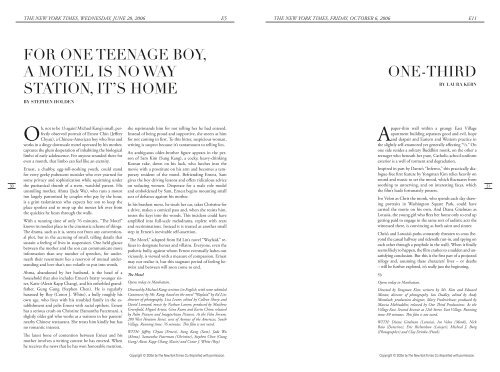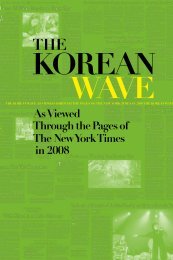The Korean Wave 2006 - Korean Cultural Service
The Korean Wave 2006 - Korean Cultural Service
The Korean Wave 2006 - Korean Cultural Service
Create successful ePaper yourself
Turn your PDF publications into a flip-book with our unique Google optimized e-Paper software.
<strong>The</strong> New York Times, wednesday, june 28, <strong>2006</strong><br />
e5<br />
<strong>The</strong> New York Times, friday, october 6, <strong>2006</strong><br />
e11<br />
for one teenage boy,<br />
a motel is no way<br />
station, it’s home<br />
By STEPHEN HOLDEN<br />
One-Third<br />
by LAURA KERN<br />
Oh, not to be 13 again! Michael Kang’s small, perfectly<br />
observed portrait of Ernest Chin (Jeffrey<br />
Chyau), a Chinese-American boy who lives and<br />
works in a dingy downscale motel operated by his mother,<br />
captures the glum desperation of inhabiting the biological<br />
limbo of early adolescence. For anyone stranded there for<br />
even a month, that limbo can feel like an eternity.<br />
Ernest, a chubby, egg-roll-noshing youth, could stand<br />
Inspired in part by Dante’s “Inferno,” this practically dialogue-free<br />
for every geeky pubescent outsider who ever yearned for<br />
first feature by Yongman Kim relies heavily on<br />
some privacy and sophistication while squirming under<br />
sound and music to set the mood, which fluctuates from<br />
30 the puritanical thumb of a stern, watchful parent. His on seducing women. Desperate for a male role model<br />
soothing to unnerving, and on interesting faces, which<br />
the film’s leads fortunately possess.<br />
31<br />
unsmiling mother, Ahma (Jade Wu), who runs a motor<br />
inn largely patronized by couples who pay by the hour,<br />
is a grim taskmistress who expects her son to keep the<br />
place spotless and to mop up the messes left over from<br />
the quickies he hears through the walls.<br />
With a running time of only 76 minutes, “<strong>The</strong> Motel”<br />
knows its modest place in the cinematic scheme of things.<br />
<strong>The</strong> drama, such as it is, stems not from any conventional<br />
plot, but in the accruing of small, telling details that<br />
sustain a feeling of lives in suspension. One held glance<br />
between the mother and the son can communicate more<br />
information than any number of speeches, for underneath<br />
their resentment lies a reservoir of mutual understanding<br />
and love that’s too volatile to put into words.<br />
Ahma, abandoned by her husband, is the head of a<br />
household that also includes Ernest’s bratty younger sister,<br />
Katie (Alexis Kapp Chang), and his enfeebled grandfather,<br />
Gung Gung (Stephen Chen). He is regularly<br />
harassed by Roy (Conor J. White), a bully roughly his<br />
own age, who lives with his troubled family in the establishment<br />
and pelts Ernest with racial epithets. Ernest<br />
has a serious crush on Christine (Samantha Futerman), a<br />
slightly older girl who works as a waitress in her parents’<br />
nearby Chinese restaurant. She treats him kindly but has<br />
no romantic interest.<br />
<strong>The</strong> latest bone of contention between Ernest and his<br />
mother involves a writing contest he has entered. When<br />
he receives the news that he has won honorable mention,<br />
she reprimands him for not telling her he had entered.<br />
Instead of being proud and supportive, she sneers at him<br />
for not coming in first. To this bitter, suspicious woman,<br />
writing is suspect because it’s tantamount to telling lies.<br />
An ambiguous older-brother figure appears in the person<br />
of Sam Kim (Sung Kang), a cocky, heavy-drinking<br />
<strong>Korean</strong> rake, down on his luck, who lurches into the<br />
movie with a prostitute on his arm and becomes a temporary<br />
resident of the motel. Befriending Ernest, Sam<br />
gives the boy driving lessons and offers ridiculous advice<br />
and emboldened by Sam, Ernest begins mounting small<br />
acts of defiance against his mother.<br />
In his brashest move, he steals her car, takes Christine for<br />
a drive, makes a comical pass and, when she resists him,<br />
tosses the keys into the woods. This incident could have<br />
amplified into full-scale melodrama, replete with tears<br />
and recriminations. Instead it is treated as another small<br />
step in Ernest’s inevitable self-assertion.<br />
“<strong>The</strong> Motel,” adapted from Ed Lin’s novel “Waylaid,” refuses<br />
to designate heroes and villains. Everyone, even the<br />
pathetic bully, against whom Ernest eventually lashes out<br />
viciously, is viewed with a measure of compassion. Ernest<br />
may not realize it, but this stagnant period of feeling betwixt<br />
and between will soon come to end.<br />
<strong>The</strong> Motel<br />
Opens today in Manhattan.<br />
Directed by Michael Kang; written (in English, with some subtitled<br />
Cantonese) by Mr. Kang, based on the novel “Waylaid” by Ed Lin;<br />
director of photography, Lisa Leone; edited by Colleen Sharp and<br />
David Leonard; music by Nathan Larson; produced by Matthew<br />
Greenfield, Miguel Arteta, Gina Kwon and Karin Chien; released<br />
by Palm Pictures and ImaginAsian Pictures. At the Film Forum,<br />
209 West Houston Street, west of Avenue of the Americas, South<br />
Village. Running time: 76 minutes. This film is not rated.<br />
WITH: Jeffrey Chyau (Ernest), Sung Kang (Sam), Jade Wu<br />
(Ahma), Samantha Futerman (Christine), Stephen Chen (Gung<br />
Gung) Alexis Kapp Chang (Katie) and Conor J. White (Roy).<br />
A<br />
paper-thin wall within a grungy East Village<br />
apartment building separates good and evil, hope<br />
and despair and Eastern and Western practice in<br />
the slightly self-enamored yet generally affecting “⅓.” On<br />
one side resides a solitary Buddhist monk, on the other a<br />
teenager who beneath her pure, Catholic-school-uniform<br />
exterior is a well of torment and degradation.<br />
Ivo Velon as Chris the monk, who spends each day drawing<br />
portraits in Washington Square Park, could have<br />
carried the movie on his own. And Diana Gitelman as<br />
Lotusia, the young girl who flees her home only to end up<br />
getting paid to engage in the same sort of sadistic acts she<br />
witnessed there, is convincing as both saint and sinner.<br />
Chris’s and Lotusia’s paths constantly threaten to cross (beyond<br />
the casual hallway and sidewalk run-in, and spying on<br />
each other through a peephole in the wall). When it finally<br />
seems likely to happen, the film crashes to a sudden and unsatisfying<br />
conclusion. But this is the first part of a projected<br />
trilogy and, assuming these characters’ lives – or deaths<br />
– will be further explored, it’s really just the beginning.<br />
⅓<br />
Opens today in Manhattan.<br />
Directed by Yongman Kim; written by Mr. Kim and Edward<br />
Moran; director of photography, Ian Dudley; edited by Andy<br />
Montlack; production designer, Mary Frederickson; produced by<br />
Marcia Mohiuddin; released by One Third Productions. At the<br />
Village East, Second Avenue at 12th Street, East Village. Running<br />
time: 89 minutes. This film is not rated.<br />
WITH: Diana Gitelman (Lotusia), Ivo Velon (Monk), Nick<br />
Raio (Detective), Eric Richardson (Lawyer), Micheal J. Burg<br />
(Photographer) and Clay Drinko (Punk).<br />
Copyright © <strong>2006</strong> by <strong>The</strong> New York Times Co. Reprinted with permission.<br />
Copyright © <strong>2006</strong> by <strong>The</strong> New York Times Co. Reprinted with permission.





